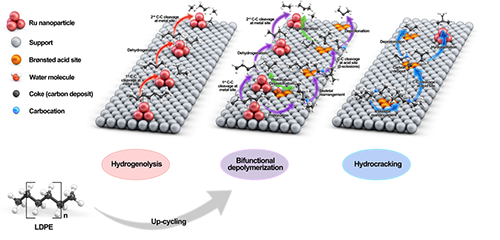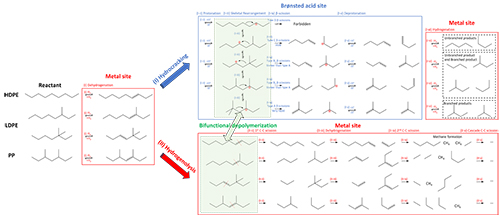Professor Ro Insoo and student Kwon Taeeun from the Green Energy and Environmental Catalyst Lab (https://catalysis.seoultech.ac.kr) at the Department of Chemical and Biological Engineering at Seoul National University of Science and Technology (Seoul Tech), along with Professor Won Wangyun and student Ahn Byung-chan from Korea University, and Dr. Kang Gi-Hyeok from the Korea Institute of Science and Technology (KIST), have published a paper in the renowned international journal Nature Communications (IF = 14.7, JCR Top 5.6%) on a catalytic reaction that converts waste plastics into high-value liquid fuels.

▲ From left: Professor Ro Insoo (Seoul Tech), student Kwon Taeeun (Seoul Tech), Professor Won Wang-yeon (Korea University), student Ahn Byeong-chan (Korea University), and Dr. Kang Gi-Hyeok (KIST)
Currently, global plastic production is about 400 million tons, but most of it is treated through landfilling (75%) and incineration (14%), with only 11% being recycled. The paper, d Unraveling the Role of Water in Mechanism Changes for Economically Viable Catalytic Plastic Upcycling, presents a catalytic process technology for selectively producing high-value fuels, such as gasoline and diesel, from waste plastics,
a major contributor to environmental pollution.
In particular, polyolefin-d waste plastics, commonly used in packaging containers and plastic films with short usage cycles, account for about 55% of total plastic waste. However, these plastics have faced low yield and economic viability issues, resulting in inadequate recycling. This research team developed a technology that enhances catalytic reactivity in polyolefin waste plastic upcycling by adding water, opening up new possibilities for plastic recycling.

▲ The newly proposed upcycling reaction mechanism (middle, shown in purple) leveraging a polyethylene-type plastic catalyst
The research team, led by the corresponding author, Professor Ro Insoo, has previously developed various catalysts to improve the efficiency of polyolefin waste plastic upcycling, publishing in prominent journals.
This study uncovers the previously unknown role of water in the polyolefin waste plastic upcycling process.
The research found that in the Ru/Zeolite-Y catalyst containing a Brønsted acid site, the addition of water enhanced catalytic reactivity and prevented carbon deposition (coking) during the reaction, improving the catalyst’s reaction stability.
Experiments conducted on various waste plastics, such as polyethylene and polypropylene, confirmed that
the addition of water increased reactivity and the production of high-value liquid fuels.

▲ The newly discovered upcycling reaction mechanism leveraging a polyethylene-type plastic catalyst
The team also collaborated with Professor Won Wangyun’s team at Korea University to conduct techno-economic analysis (TEA) and life cycle assessment (LCA), which confirmed that this process could reduce carbon dioxide emissions by replacing conventional fossil fuel-d production processes. Furthermore, the improved reactivity due to water addition was found to lead to the development of economically feasible processes.
The research team plans to study catalysts applicable not only to polyethylene upcycling but also to other types of plastics, including mixed waste plastics.
This research was supported by the National Research Foundation of Korea, the Korea Environmental Industry & Technology Institute, and the Korea Energy Technology uation and Planning.
www.nature.com/articles/s41467-024-54495-5

